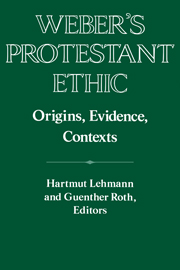Book contents
- Frontmatter
- Introduction
- Part I Background and Context
- Part II Reception and Response
- 10 The Longevity of the Thesis: A Critique of the Critics
- 11 The Use and Abuse of Textual Data
- 12 Biographical Evidence on Predestination, Covenant, and Special Providence
- 13 The Thing that Would Not Die: Notes on Refutation
- 14 Historical Viability, Sociological Significance, and Personal Judgment
- 15 The Historiography of Continental Calvinism
- 16 The Protestant Ethic and the Reality of Capitalism in Colonial America
- 17 The Economic Ethics of the World Religions
- 18 “Meet Me in St. Louis”: Troeltsch and Weber in America
- Index
18 - “Meet Me in St. Louis”: Troeltsch and Weber in America
Published online by Cambridge University Press: 05 January 2013
- Frontmatter
- Introduction
- Part I Background and Context
- Part II Reception and Response
- 10 The Longevity of the Thesis: A Critique of the Critics
- 11 The Use and Abuse of Textual Data
- 12 Biographical Evidence on Predestination, Covenant, and Special Providence
- 13 The Thing that Would Not Die: Notes on Refutation
- 14 Historical Viability, Sociological Significance, and Personal Judgment
- 15 The Historiography of Continental Calvinism
- 16 The Protestant Ethic and the Reality of Capitalism in Colonial America
- 17 The Economic Ethics of the World Religions
- 18 “Meet Me in St. Louis”: Troeltsch and Weber in America
- Index
Summary
Ernst Troeltsch and Max Weber, seminal figures in modern sociology and thought and penetrating analysts of the modern world, visited in 1904 the United States, the country most closely associated with what Max Weber called the “spirit of capitalism.” And not only did they see - as German scholars were accustomed to see - New England and the East Coast, but also America's heartland, the Midwest, and, in the case of Weber, the South and the West. The occasion was an invitation to attend the World Congress of Arts and Sciences in St. Louis. This congress was part of the 1904 Louisiana Purchase Exposition, a world's fair remembered today mainly through the hit song by Judy Garland, “Meet me in St. Louis, Louis, meet me at the fair,” from the musical by the same name.
And yet the congress, which today is all but forgotten and which the American historian Frederick H. Jackson more than forty years ago called “a neglected landmark in the history of ideas,” deserves further elucidation, if only to set the stage for Troeltsch's and Weber's American visit. When reconstructing this visit, I had the opportunity to use not only the letters of the Webers, as found in Marianne Weber's biography of her husband Max, but also the hitherto unpublished travel accounts of Ernst Troeltsch, as well as many other local sources that recorded the tracks of the two scholars on their way.
- Type
- Chapter
- Information
- Weber's Protestant EthicOrigins, Evidence, Contexts, pp. 357 - 384Publisher: Cambridge University PressPrint publication year: 1993
- 4
- Cited by



